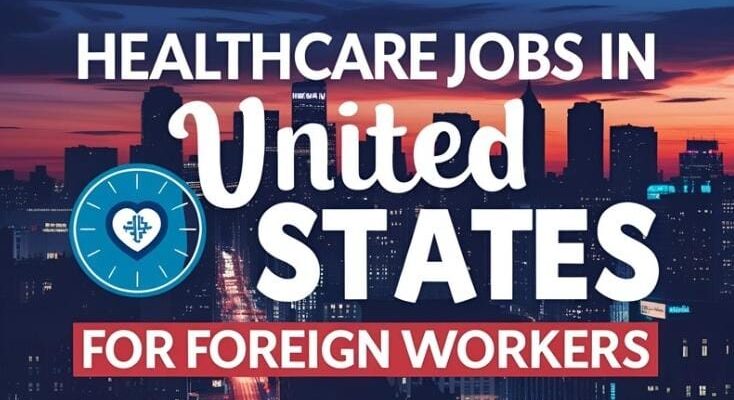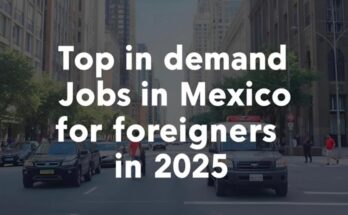Healthcare Jobs in the United States for Foreign Workers
The pursuit of a rewarding career in healthcare often directs skilled international professionals towards the U.S. medical sector. The vast and dynamic American healthcare landscape is filled with opportunities for foreign medical graduates. As the need for skilled healthcare workers escalates, the U.S. welcomes those eager to contribute their expertise and cultural perspectives to its medical community.
For those exploring healthcare employment visas, the journey may seem complex, yet it is rich with potential. Joining the U.S. healthcare system allows individuals to be at the cutting edge of medical advancements and patient care. Every year, numerous foreign professionals take on the challenge of working in health-related fields across the country. This effort enhances the quality and diversity of U.S. healthcare services.

Key Takeaways
- U.S. healthcare offers extensive opportunities for international healthcare professionals.
- Understanding the structure of the U.S. healthcare system is critical for foreign workers.
- Foreign medical graduate opportunities span various specialties and positions.
- Healthcare employment visas are a vital component of the employment process for international applicants.
- The demand for global talent underscores the importance of diversity in U.S. medical employment.
Overview of the U.S. Healthcare System
The U.S. healthcare industry is a complex and dynamic field, heavily influenced by both policy and market forces. It encompasses a variety of institutions and stakeholders, profoundly affecting the healthcare employment landscape.
The Structure of Healthcare in the United States
At the core of the American healthcare system are institutions such as private and public hospitals, specialized clinics, and research facilities. These entities operate within a framework regulated by both state and federal law. Private insurance companies play a significant role, shaping the delivery of medical services and the operational dynamics of these institutions.
Opportunities and Challenges for Foreign Workers
Foreign healthcare workers in the USA face numerous opportunities due to staffing shortages in various sectors, including rural and inner-city hospitals. However, they encounter significant challenges such as licensing examinations, cultural barriers, and the need for certification equivalence.

Understanding these complexities is crucial for foreign professionals aiming to engage with the U.S. healthcare system effectively. Whether navigating the employment landscape or adapting to cultural nuances, thorough preparation and knowledge are essential. They are key to leveraging the opportunities available in the USA.
Types of Healthcare Jobs Available to Foreign Workers
The U.S. healthcare industry offers a wide range of employment opportunities for foreign-born professionals. These include foreign nursing positions and specialized medical roles for immigrants. These positions are designed to efficiently integrate international medical graduates into the healthcare system. This section explores the prominent fields of nursing and in-demand healthcare specialties, highlighting their importance for international practitioners.
Nursing Positions
The need for nursing staff is increasing, with foreign nursing opportunities expanding across various states. Hospitals, long-term care facilities, and community health centers are actively seeking qualified candidates from around the globe. These roles not only provide a stable career path but also fill critical gaps in regions facing nursing shortages.
- Registered Nurse (RN)
- Practical Nurse (PN)
- Nurse Practitioners (NP)
Medical Specialties in High Demand
International medical graduates and professionals find a variety of niche roles in the U.S. healthcare system. Fields like cardiology, oncology, and anesthesiology are particularly in need of skilled practitioners. These specialties are not only rewarding but also crucial in addressing the complex healthcare challenges of the American population.

The integration of medical jobs for immigrants into these critical sectors significantly enhances patient care. It meets the growing healthcare demands in the country. The effective utilization of skills from international medical graduates ensures that healthcare delivery remains robust and comprehensive.
Requirements for Healthcare Jobs
For international professionals aiming for healthcare roles in the United States, grasping the medical licensure for foreign workers is essential. This involves navigating the healthcare certification process, obtaining a U.S. work visa for medical jobs, and completing residency programs for international graduates. This section outlines these foundational requirements to guide you through your journey into the U.S. healthcare system.
Qualifications and Certifications
To practice in the U.S., foreign-trained medical professionals must meet specific qualifications and certifications. Physicians need to pass the United States Medical Licensing Examination (USMLE), a three-step exam. It tests their ability to apply knowledge, concepts, and principles crucial for patient care and disease management. Nurses, on the other hand, must pass the National Council Licensure Examination (NCLEX) to obtain nursing licensure. Additionally, all healthcare professionals must undergo a detailed credential verification process. This is led by the Educational Commission for Foreign Medical Graduates (ECFMG) or similar bodies, to validate their foreign degrees and qualifications.
Visa and Residency Requirements
Obtaining a U.S. work visa for medical jobs requires several options, each based on the applicant’s occupational needs and status. The H-1B visa is common among international medical graduates with a job offer from a U.S. employer. The J-1 visa offers educational opportunities through residency programs for international graduates. For those with extraordinary abilities in their field, the O-1 visa is another option. Each visa has specific criteria and application processes that need careful consideration and timely preparation.
| Type of Visa | Usual Purpose | Key Requirements |
|---|---|---|
| H-1B | Employment in specialty occupations | Job offer from U.S. employer, Bachelor’s degree or higher |
| J-1 | Exchange visitor for medical training | Acceptance in a certified U.S. residency program |
| O-1 | Individuals with extraordinary abilities in sciences, arts, education, business, or athletics | Demonstration of extraordinary ability, significant awards, or international recognition |
Starting a career in the U.S. healthcare sector as an international medical professional demands thorough preparation and understanding of various certification and visa requirements. Adhering to these processes is crucial for securing the opportunity to contribute to the healthcare landscape in the United States.
Spotlight on Nursing: A Route for International Applicants
The United States is facing a severe U.S. nursing shortage, creating a wealth of opportunities for international workers. Nursing is particularly attractive for those looking to enter the healthcare sector, addressing the growing need for professionals. International nursing recruitment efforts have surged, aiming to link skilled nurses from abroad with the hospitals that desperately need them.
For foreign-educated nurses aiming for a foreign nurse career path in the U.S., the journey starts with obtaining U.S.-recognized nursing credentials. This involves credential evaluation, passing the NCLEX-RN exam, and fulfilling state-specific licensing requirements. To ease this process, support systems like visa sponsorship for nurses are in place. Many U.S. healthcare institutions offer sponsorship and visa assistance, showing their dedication to solving the shortage with international talent.
Starting a nursing career in a new country can be challenging, but there are numerous resources available for international nurses. The U.S. provides language support and dedicated recruitment programs to help foreign nurses integrate into the workforce. These initiatives not only bridge cultural and professional gaps but also provide a clear path to employment. As the need for skilled healthcare workers escalates, international nurses will find the U.S. a land of opportunity, where their skills are both needed and appreciated.



